View the retreat programs from years past.
Welcome and Opening Remarks – David Holtzman and Anneliese Schaefer (WashU Neurology)
Welcome from Retreat Organizers – Geraldine Kress (WashU Neurology) and Brian Gordon (WashU Radiology)
Short talks Session I
Moderated by Jason Ulrich (WashU Neurology)
- Eileen Lynch (Weihl lab, WashU Neurology) – “TDP-43 aggregation and seeding in skeletal muscle”
- Karl Friedrichsen (Brier lab, WashU Neurology) – “Increased S1PR1 Expression in Multiple Sclerosis Lesions Compared to Normal-Appearing White Matter as Measured by 11C-CS1P1 PET”
- Yun Chen (Holtzman and Colonna labs, WashU Neurology and Pathology & Immunology) – “APOE3ch alters microglial response and suppresses Ab-induced tau seeding and spread”
- Masatoshi Inoue (WashU Radiology) – “Multimodal Optical Interrogation of Neural Circuits that Control Social Interactions”
Danny Jaschek (WashU Medicine Corporate & Foundation Relations)
Speaker Introduction – Anneliese Schaefer (WashU Neurology)
Short talks Session II
Moderated by Aisling Chaney (WashU Radiology)
- Vishnu Muraleedharan Saraswathy (Mokalled lab, WashU Developmental Biology) – “Single-cell analysis of innate spinal cord regeneration identifies intersecting modes of neuronal repair”
- Zelun Wang (Williams and Apte labs, WashU Ophthalmology & Visual Sciences) – “Energetic heterogeneity in retinal ganglion cells: role of neuronal activity and implications for resilience”
- Marta Celorrio (Friess lab, WashU Pediatrics) – “Gut Microbiota shape oligodendrocyte response after TBI”
Hope Center Lecture
Speaker Introduction by David Holtzman (WashU Neurology)
- Joseph Lewcock (Denali Therapeutics) – “Targeting brain delivery of biotherapeutics for neurodegenerative disease”
Short talks Session III
Moderated by Carla Yuede (WashU Psychiatry)
- Farzaneh Mirfakhar (Karch lab, WashU Psychiatry) – “Trapped in transit: Tau accumulates in stem cell model of tauopathy through Autophagy and lysosomal impairments”
Short talks Session IV
Moderated by Miguel Minaya (WashU Psychiatry)
- Joseph Bradley (Cruchaga lab, WashU Psychiatry) – “Novel genes and risk loci identified in large-scale multi-ethnic analysis of earlier-onset Alzheimer Disease”
- Caitlin Dingwall (Milbrandt lab, WashU Genetics) – “Phosphatidylserine exposure is an early SARM1-dependent axonal danger signal that triggers phagocytosis of stressed-but-viable axons”
- Aleksandra Beric (Ibanez lab, WashU Psychiatry) – “Circulating blood circular RNA in Parkinson’s Disease; a systematic study”
- Yang Li (WashU Genetics and Neurosurgery) – “A comparative atlas of single-cell chromatin accessibility in the human brain”
Closing Remarks
Poster Session








Welcome and Opening Remarks – David Holtzman and Anneliese Schaefer (WashU Neurology)
Welcome from Retreat Organizers – Geraldine Kress (WashU Neurology) and Brian Gordon (WashU Radiology)
Short talks Session I – Moderated by Jason Ulrich (WashU Neurology)
- Sheng (Andy) Chen (Jackrel lab, WashU Chemistry) – “HtrA1 prevents and reverses α-synuclein aggregation, rendering it non-toxic and seeding incompetent”
- Megan Bosch (Holtzman lab, WashU Neurology) – “Sodium oligomannate alters gut microbiota, reduces cerebral amyloidosis and reactive microglia in a dose- and sex-specific manner”
- Aisling Chaney (WashU Radiology) – “Non-invasive PET imaging of neuroimmune responses in Neurodegeneration”
Short talks Session II – Moderated by Oscar Harari (WashU Psychiatry)
- Daniel Western (Cruchaga lab, WashU Psychiatry) – “Integration of cerebrospinal fluid pQTL and GWAS prioritizes novel candidate genes involved in Alzheimer’s disease”
- Reshma Bhagat (Karch lab, WashU Psychiatry) – “Long non-coding RNA SNHG8 drives stress granule formation in MAPT mutation carriers”
- Chengcheng Li (Weihl lab, WashU Neurology) – “Comprehensive functional characterization of SGCB variants causing Limb-Girdle Muscular Dystrophy”
Hope Center Lecture
Speaker Introduction by David Holtzman (WashU Neurology)
- Michael Ward (NINDS, NIH) – “Leveraging iPSC models and ‘omics to unlock the mysteries of neurodegenerative diseases”
Short talks Session III – Moderated by Aaron DiAntonio (WashU Developmental Biology)
- Rui (Rikki) Feng (Cavalli lab, WashU Neuroscience) – “Antagonizing Endothelin B receptor in satellite glial cells improves nerve regeneration and aging-dependent neuronal regenerative decline”
- Ikbal Şencan-Eğilmez (WashU Radiology) – “Optical microscopy for quantifying oxygenation and blood flow during healthy and diseased conditions in mouse: Brain and beyond”
Short talks Session IV – Moderated by Celeste Karch (WashU Psychiatry)
- Bridget Phillips (Cruchaga lab, WashU Psychiatry) – “Proteome Wide Association Studies of LRRK2 variants identify novel causal and druggable proteins for Parkinson’s disease”
- Danira Toral Rios (Cashikar/Paul lab, WashU Psyhiatry) – “25-hydroxycholesterol mediates neuroinflammation and neurodegeneration in a tauopathy mouse model”
Closing Remarks
Poster Session
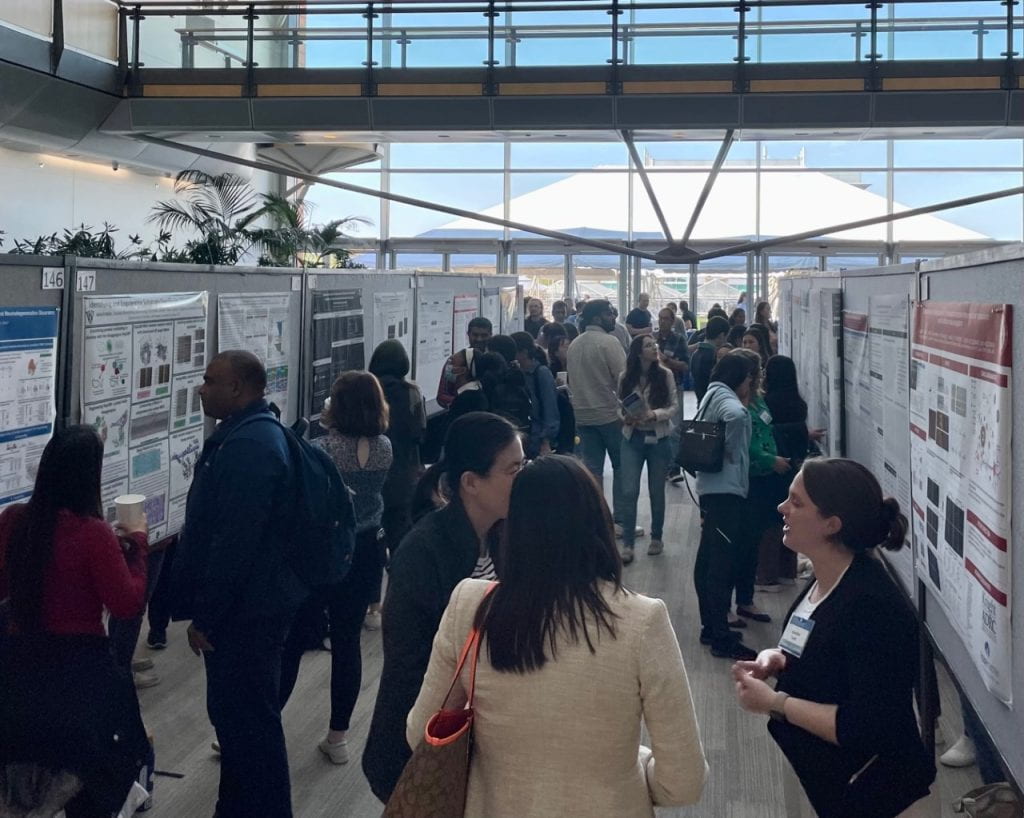
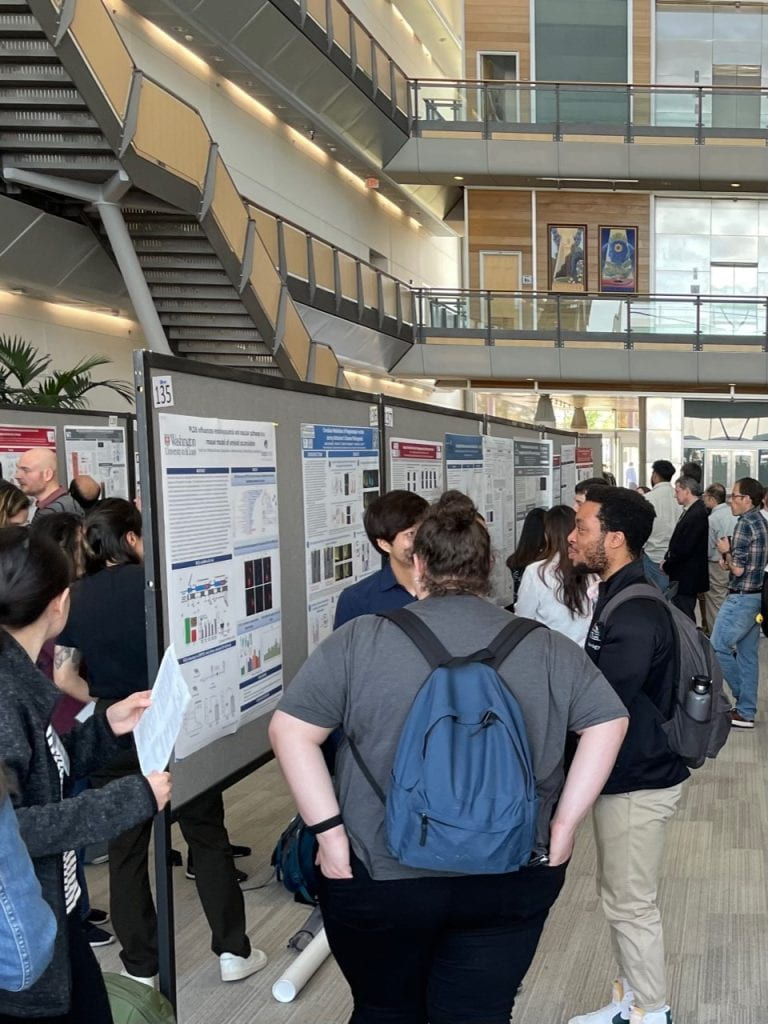
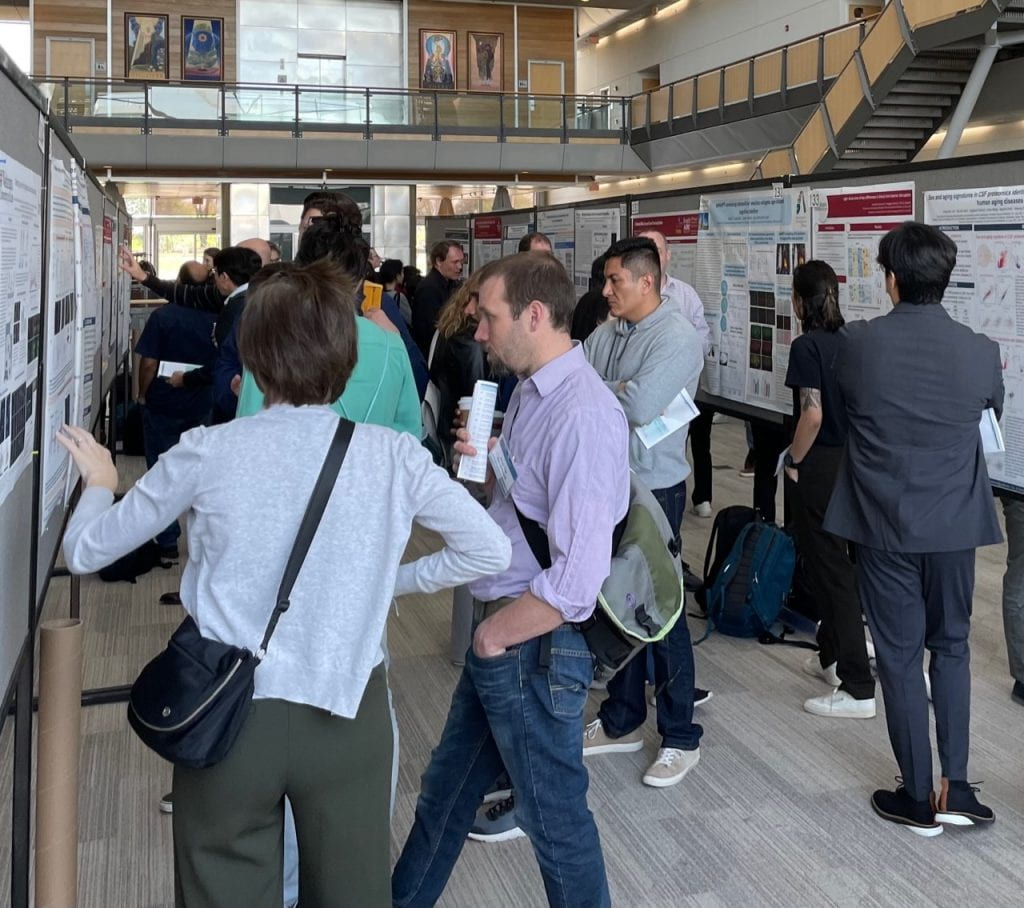
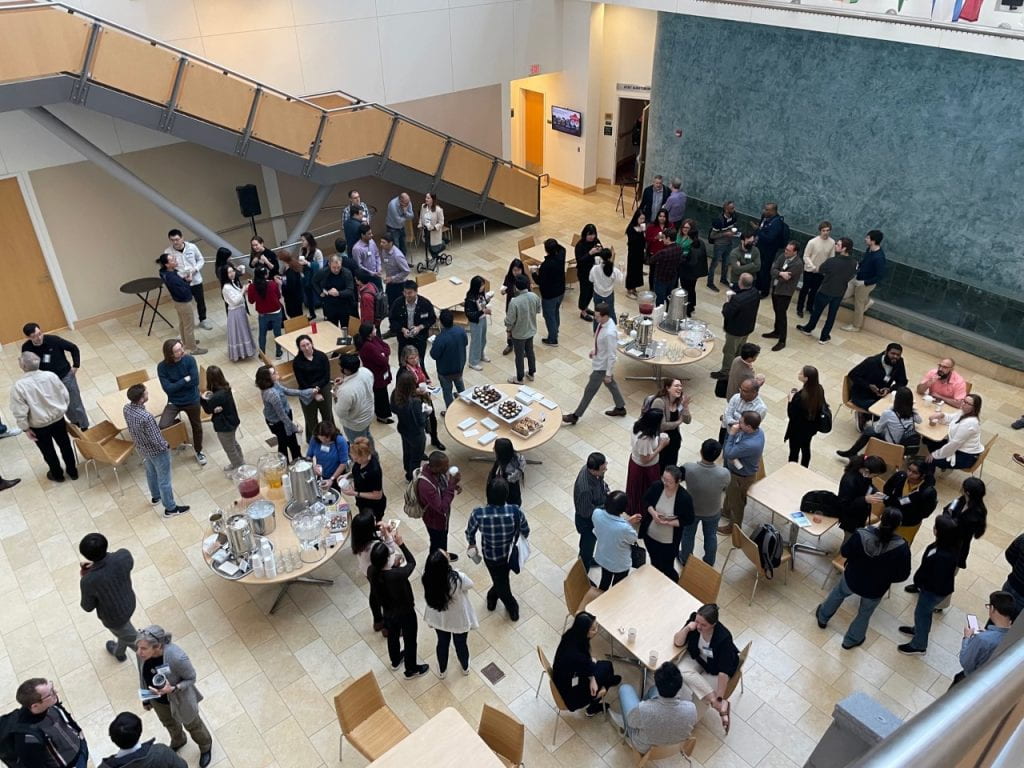
Zoom: Short talks, keynote lectures; In person: Poster session
Welcome and Opening Remarks – David Holtzman, MD and Anneliese Schaefer, JD, PhD
Welcome from Retreat Organizers – Celeste Karch, PhD and Carlos Cruchaga, PhD
Session 1: Neurogenetics & Transcriptomics
Moderated by Gabriel Haller, PhD (Neurosurgery)
- Jiayang Chen (Dougherty Lab, Genetics)
“Molecular functions of ID/ASD-associated MYT1L during early brain development” - Ciyang Wang (Cruchaga Lab, Psychiatry)
“Discovery of genetic regulators of human metabolites in CSF”
Session 2: Clocks & Sleep Club and Lysosome Processing & Transport
Moderated by Paul Taghert, PhD (Neuroscience)
- Samira Parhizkar, PhD (Holtzman Lab, Neurology)
“Sleep loss exaggerates TREM2-dependent inflammation irrespective of amyloid plaque deposition” - Celia McKee (Musiek Lab, Neurology)
“The astrocyte circadian clock regulates autophagy and endolysosome function”
Hope Center Lecture
Speaker Introduction by Conrad Weihl, MD, PhD (Neurology)
- Louise Rodino-Klapac, PhD (Sarepta Therapeutics, Inc.)
“Development of gene therapies for muscular dystrophies”
Hope Center Lecture
Speaker Introduction by Celeste Karch, PhD (Psychiatry)
- Martin Kampmann, PhD (University of California, San Francisco)
“Elucidating molecular and cellular mechanisms of neurodegenerative disease by CRISPR-based functional genomics”
Session 3: Protein Aggregation & Neurodegeneration and Lipid Metabolism
Moderation by Anil Cashikar, PhD (Psychiatry)
- Shih Feng You (Karch Lab, Psychiatry)
“MS4A4A modifies the risk of Alzheimer’s disease and regulates cholesterol metabolism and immune response” - Antoine Drieu, PhD (Kipnis Lab, Pathology & Immunology)
“Parenchymal border macrophages regulate brain physiology via CSF flow dynamics”
Neurovascular Injury & Repair, Axon Injury & Repair, and NeuroRestorative Therapy
Moderated by Valeria Cavalli, PhD (Neuroscience)
- Xiaodan Wang (Bauer Lab, Radiology)
“Dual fluorophore imaging along the neurovascular coupling pathway” - Dana Shaw, PhD (Mokalled lab, Developmental Biology)
“An intricate immune balance necessary for natural spinal cord regeneration”
Poster Session
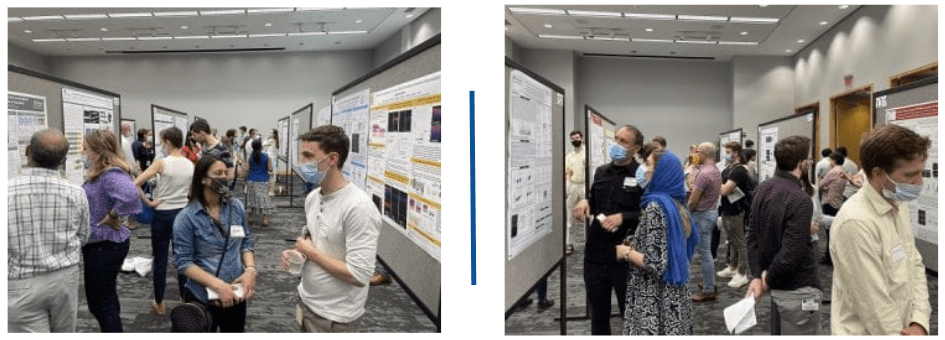
Welcome and Opening Remarks – David Holtzman, MD and Anneliese Schaefer, JD, PhD
NeuroRestorative Therapy Group
NeuroRestorative Session Chair: Hiroko Yano, PhD (WashU Neurosurgery)
- Lu Zhao, PhD (Cui Lab, WashU Biomedical Engineering)
“A potential sonogenetic actuator for ultrasound-mediated neuromodulation”
Neurogenetics & Transcriptomics Group
Neurogenetics Session Chair: Gabriel Haller, PhD (WashU Neurosurgery)
- Logan Brase (Harari Lab, WashU Psychiatry)
“Single-nuclei RNA-sequencing of Alzheimer Disease brains reveals altered cell expression state compositions linked to autosomal dominant, TREM2 and rs1582763 variants” - Chengran Yang (Cruchaga Lab, WashU Psychiatry)
“Genomic and multi-tissue proteomic integration for understanding the genetic architecture of Alzheimer disease and Parkinson’s disease”
Protein Aggregation & Neurodegeneration Group
Neurodegeneration Session Chair: Chris Weihl, MD, PhD ( WashU Neurology)
- Jiang Zhu (Weihl Lab, WashU Neurology)
“VCP protects neurons from proteopathic seeding” - Maud Gratuze, PhD (Holtzman Lab, WashU Neurology)
“Activated microglia mitigate Aβ-associated tau seeding and spreading” - Lucia Capano (Yoo Lab, WashU Developmental Biology)
“MicroRNA-mediated neuronal reprogramming generates human neurons that express tau isoform expression comparable to adult brains” - Zachary Grese (Ayala Lab, SLU Biochemistry Molecular Biology)
“RNA is a platform for TDP-43 liquid-liquid phase separation and promotes TDP-43 solubility through specific binding”
Clocks & Sleep Club
Clocks & Sleep Session Chair: Erik Herzog, PhD (WashU Biology)
- Patrick Sheehan (Musiek Lab, WashU Neurology)
“Astrocytic BMAL1 regulates protein aggregation in mouse models of alpha-synuclein and tau pathology”
Hope Center Lecture
Speaker Introduction: Timothy Miller, MD, PhD (WashU Neurology)
- Merit Cudkowicz, MD, MSc (Harvard Medical School, Massachusetts General Hospital)
“New Therapies for ALS”
Program
Welcome and Opening Remarks – David Holtzman, MD and Anneliese Schaefer, JD, PhD
Session 1: Lysosome Processing & Transport Group
Lysosome Chair: Bruno Benitez, MD (Psychiatry)
- Leah Czerniewski (Lee Lab, Neurology)
“Tracking the intracellular itinerary of APP and de novo Aβ generation using click chemistry” - Andrew Findlay, MD (Weihl Lab, Neurology)
“Lithium chloride corrects weakness and myopathology in a preclinical model of LGMD1D”
Session 2: Protein Aggregation & Neurodegeneration Group
Neurodegeneration Chair: Timothy Miller, MD, PhD (Neurology)
- Fabia Filipello, PhD (Piccio Lab, Neurology/Karch Lab, Psychiatry)
“The MS4A gene cluster is a key modulator of soluble TREM2 and Alzheimer disease risk” - Rachel French, PhD (Ayala Lab, SLU Biochemistry)
“TDP-43 oligomers detected as initial intermediate species during aggregate formation“
Session 3: Neurogenetics & Transcriptomics Group
Neurogenetics Chair: Oscar Harari, PhD (Psychiatry)
- Matthew Lalli, PhD (Mitra/Milbrandt Labs, Genetics)
“Rapid high-throughput single-cell neurodevelopmental disease modeling” - Michael Vasek, PhD (Dougherty Lab, Genetics)
“Microglia: Local translation and synaptic homeostasis”
Hope Center Lecture – Guoping Feng, PhD (Massachusetts Institute of Technology)
“Dissecting synaptic and circuitry mechanisms of psychiatric disorders”
Hope Center Lecture – Sally Temple, PhD (Neural Stem Cell Institute)
”Neural stem cells in aging and modeling neurodegenerative disease”
Session 4: Clocks & Sleep Club and NeuroRestorative Therapy Group
Clocks & Sleep Chair: Yao Chen, PhD (Neuroscience)
NeuroRestorative Chair: Fumihiko Urano, MD, PhD (Medicine)
- Percy Griffin (Musiek Lab, Neurology)
“Circadian regulation of neuroinflammation and neurodegeneration by Rev-erbα” - Sindhu Manivasagam (Klein Lab, Medicine)
“Investigating type III interferons as a novel therapeutic target during autoimmune neuroinflammation”
Session 5: Neurovascular Injury & Repair and Axon Injury & Repair Groups
Neurovascular Chair: Jin Moo Lee, MD, PhD (Neurology)
Axon Chair: Valeria Cavalli, PhD (Neuroscience)
- Hailun Li (DiAntonio Lab, Developmental Biology)
“A novel potassium buffering mechanism for neuroprotection against ischemic stroke” - Satya Kothapalli, PhD (Yablonskiy Lab, Radiology)
“In vivo measurements of Alzheimer disease-related neuronal loss in the hippocampal subfields with quantitative Gradient Recalled Echo (qGRE) MRI”
Poster session
Program
Welcome and Opening Remarks from David Holtzman, MD and Anneliese Schaefer, JD, PhD
Hope Center Lecture – Leonard Petrucelli, PhD (Mayo Clinic Florida)
“Mechanistic and Therapeutic Insights into c9FTD/ALS”
Session 1: Neurodegeneration Group (Chair: Timothy Miller, MD, PhD (Neurology))
- Kiersten Ruff, PhD (Pappu Lab, Biomedical Engineering)
“Polyglutamine length dependent structural properties and phase behavior of huntingtin exon 1” - Tien-Phat Huynh (Holtzman Lab, Neurology)
“Age-dependent effects of apoE reduction using antisense oligonucleotides in a model of β-amyloidosis”
Session 2: Lysosome Processing & Transport Group (Chair: Bruno Benitez, MD (Medicine)); NeuroRestorative Therapy Group (Chairs: Albert Kim, MD, PhD (Neurosurgery) and Fumihiko Urano, MD, PhD (Medicine))
- Devi Annamalai, PhD (Kim Lab, Neurosurgery)
“Epigenomic reprogramming as a therapeutic strategy for malignant gliomas” - Sidhartha Mahali, PhD (Karch Lab, Psychiatry)
“Lysosomal dysfunction and altered tau metabolism in stem cell models of autosomal dominant Alzheimer’s disease”
Session 3: Neurovascular Injury & Repair Group (Chair: Jin-Moo Lee, MD, PhD (Neurology))
- Charise Garber (Klein Lab, Medicine)
“T-cells promote microglial activation and prevent cognitive recovery from viral encephalitis via interferon gamma” - Deepti Diwan, PhD (Zipfel Lab, Neurosurgery)
“Sirt1 mediates hypoxic conditioning-induced delayed cerebral ischemia protection in subarachnoid hemorrhage”
Session 4: Neurogenetics & Transcriptomics Group (Chair: Carlos Cruchaga, PhD (Psychiatry))
- Umber Dube (Cruchaga Lab, Psychiatry)
“Circular RNAs in Alzheimers disease brain tissues” - Denis Avey, PhD (Milbrandt Lab, Genetics)
“Single cell RNA-seq facilitates characterization of glial and neuronal responses to morphine”
Session 5: Axon Injury & Repair Group (Chair: Valeria Cavalli, PhD (Neuroscience))
- Scott Karney-Grobe (DiAntonio Lab, Developmental Biology)
“HSP90 is a chaperone for DLK and is required for axon injury signaling” - Deng Pan (Mackinnon Lab, Surgery)
“Reduced T cell accumulation in long gap nerve injuries inhibit peripheral nerve regeneration”
Poster session
Program
Welcome and Opening Remarks from David Holtzman, MD and Anneliese Schaefer, JD, PhD
Session 1: Neurogenetics & Transcriptomics (Chair: Carlos Cruchaga, PhD (Psychiatry))
- Kristina Sakers (Dougherty Lab, Genetics)
“Astrocyte local translation and the role of quaking RNA binding protein in mRNA export and protein stability” - Victoria Fernandez, PhD (Cruchaga Lab, Psychiatry)
“Novel candidate variants in late onset Alzheimer Disease detected by the Familial Alzheimer Sequencing (FASe) Project”
Session 2: Neurovascular Injury & Repair (Chair: Jin-Moo Lee, MD, PhD (Neurology))
- Hamid Salimi, PhD (Klein Lab, Neuroscience)
“Encephalitic alphaviruses: neurotropism and mechanisms of CNS entry” - Zachary Rosenthal (Lee Lab, Neurology)
“Recovery of cortical delta band functional connectivity after focal ischemia”
Session 3: Axon Injury & Repair (Chair: Valeria Cavalli, PhD (Neuroscience))
- Kow Essuman (Milbrandt Lab, Genetics)
“Identification of the NAD+ consuming enzyme that promotes axonal death during injury and disease” - Young Mi Oh, PhD (Cavalli Lab, Neuroscience)
“miRNA-9 regulates axon regeneration through modulation of the epigenetic factor UHRF1 and the transcriptional regulator REST”
Roderick Corriveau, PhD (NIH/NINDS)
“NINDS Mission, AD/ADRD Research Initiatives, Training and Diversity Career Development”
Hope Center Lecture: Laura Ranum, PhD (University of Florida)
“Repeat associated non-ATG (RAN) translation: new starts and directions in neurologic disease”
Session 4: Neurodegeneration (Chair: Timothy Miller, MD PhD (Neurology))
- Yang Shi, PhD (Holtzman Lab, Neurology)
“Effect of apolipoproteinE on tau pathogenesis and tau-mediated neurodegeneration” - Min-Yu Sun, PhD (Mennerick Lab, Psychiatry)
“A chemogenetic approach reveals synaptic contributions of δ subunit-containing GABAA receptors in dentate granule neurons”
Session 5: Lysosome Processing & Transport and NeuroRestorative Therapy (Chairs: Bruno Benitez, MD and Fumihiko Urano, MD PhD (Medicine))
- Yedda Li (Mark Sands, Genetics)
“Combination therapy increase lifespan and improves clinicobehavioral performance in the murine model of globoid cell leukodystrophy” - Daniel Abernathy (Andrew Yoo, Developmental Biology)
“MicroRNA-induced epigenetic remodeling during direct cell-fate conversion of adult human fibroblasts”
Poster session
Program
Welcome and Opening Remarks from David Holtzman, MD and Anneliese Schaefer, JD, PhD
Session 1: Axon Injury & Repair (Chairs: Valeria Cavalli, PhD(Neuroscience) / David Brody, MD, PhD (Neurology))
- Dan Carlin, PhD (Cavalli Lab, Neuroscience)
“mTOR activation stimulates axon regeneration in nociceptive neurons without promoting pain” - Lauren Walker (DiAntonio Lab, Developmental Biology)
“MAPK signaling functions upstream of SARM1 to promote axonal degeneration”
Session 2: Neurogenetics (Chair: Christina Gurnett, MD, PhD(Neurology))
- Darshan Sapkota, PhD (Dougherty Lab, Genetics)
“Cell type-specific translational profiling of the mouse brain by coupling TRAP to ribosome footprinting” - Yuetiva Robles (Cruchaga Lab, Psychiatry)
“CSF levels of amyloid beta and tau as endophenotypes reveal novel variants potentially informative for Alzheimer disease”
Session 3: Clocks/Neurovascular (Chair/s: Dmitri Nusinow, PhD (Danforth Plant Science Center) /Andria Ford, MD and Jin-Moo Lee, MD, PhD (Neurology))
- Brian Lananna (Musiek Lab, Neurology)
“The astrocyte circadian clock regulates astrogliosis and neuronal injury” - Courtney Sobieski (Mennerick Lab, Psychiatry)
“Reductionism reveals resilience: meeting neuronal energetic demands in a stark environment”
Orla Smith, PhD (Managing Editor, Science Translational Medicine)
“Challenges in scientific publishing: an editor’s perspective”
Hope Center Lecture: Beverly Davidson, PhD (University of Pennsylvania)
“Emerging therapies for inherited brain diseases”
Session 4: Neurodegeneration (Chair: Chris Weihl, MD, PhD(Neurology))
- Tyler Ulland, PhD (Colonna Lab, Pathology and Immunobiology)
“TREM2-mediated early microglial response limits diffusion and toxicity of amyloid plaques” - Christina Ising, PhD (Holtzman Lab, Neurology)
“AAV-mediated expression of anti-tau scFvs markedly decreases pathological tau accumulation in a mouse model of tauopathy” - Dhruva Dhavale, PhD (Kotzbauer Lab, Neurology)
“Structural requirements of alpha-synuclein fibril formation” - Mariah Lawler (Miller Lab, Neurology)
“Cell type specific miRNA profiling reveals candidate biomarker of motor neuron disease”
Poster session
Program
Welcome and Opening Remarks Celeste Karch & Carlos Cruchaga
Session 1: Neurovascular Injury & Repair (Chair: Andria Ford (Neurology))
- Andrew Kraft (Lee Lab, Neurology)
“Sensory deprivation following cortical focal ischemia facilitates remapping and accelerates behavioral recovery” - Rafael Galindo (Assistant Professor, Neurology)
“Neuroprotective role of nicotinamide mononucleotide adenylyl-transferase 3 in a mouse model of neonatal cerebral ischemia”
Session 2: Axon Injury & Repair (Chair: David Brody (Neurology))
- Yongcheol Cho (Cavalli Lab, Anatomy & Neurobiology)
“Activating injury-responsive genes with hypoxia enhances axon regeneration through neuronal HIF-1α” - Gwen Hoben (Mackinnon Lab, Surgery)
“Characterization of senescent Schwann cells’ role in limiting axonal regeneration”
Session 3: Neurogenetics (Chair: Christina Gurnett (Neurology))
- Sarah Petersen (Monk Lab, Developmental Biology)
“GPR126 has distinct, domain-dependent functions in Schwann cell development mediated by interaction with laminin-211” - Gabriel Haller (Gurnett Lab, Neurology)
“Massively parallel single nucleotide mutagenesis using reversibly- terminated inosine”
Hope Center Lecture: Daria Mochly-Rosen (Stanford University)
”Correcting Abnormal Mitochondrial Dynamics in Neurogenerative and Cardiovascular Diseases”
Session 4: New Research Interest Groups (Chair: Carlos Cruchaga (Psychiatry))
- Lysosome Processing & Transport: Bruno Benitez (Sands Lab, Medicine)
“Lysosomal and synaptic dysfunction in Autosomal Dominant Adult Onset Neuronal Ceroid Lipofuscinosis (AD-ANCL)” - Clocks & Sleep: Jerrah Holth (Holtzman Lab, Neurology)
“The interaction between sleep and tau pathology in the P301S tauopathy mouse model”
Rajesh Ranganathan (NINDS/NIH)
“NINDS Office of Translational Research: New Programs to Support Therapy and Device Discovery and Development”
Session 5: Neurodegeneration (Chair: Chris Weihl (Neurology))
- Chandana Buddhala (Kotzbauer Lab, Neurology)
“Regional deficits in dopaminergic, serotonergic and noradrenergic innervation in Parkinson disease dementia” - Matthew Brier (Ances Lab, Neurology)
“Local and distributed effect of amyloid deposition on glucose metabolism in preclinical Alzheimer’s disease”
Poster Session
Program
Welcome and Opening Remarks Celeste Karch & Carlos Cruchaga
State of the Hope Center Alison Goate, Director
Session 1: Axon Injury & Repair (Chair: Valeria Cavalli (Anatomy and Neurobiology))
- Matthew MacEwan (Ray Lab, Neurological Surgery)
“Neuroregenerative electrodes enable functional electrical stimulation of peripheral motor axons and distal musculature” - Geraldine Kress (Mennerick Lab, Psychiatry)
“Temporally distinct monosynaptic and disynaptic components of dopamine release” - Vera Valakh (DiAntonio Lab, Developmental Biology)
“Cytoskeletal destabilization activates the DLK pathway to regulate synapse development and axonal regrowth”
Session 2: Neurovascular Injury & Repair (Chair: Jin-Moo Lee (Neurology))
- Kathrin Andrich (Bieschke Lab, Biomedical Engineering)
“Aggregation in Systemic light chain amyloidosis (AL amyloidosis)” - Eric Milner (Zipfel Lab, Neurological Surgery)
“Post-conditioning reduces subarachnoid hemorrhage–inducedneurovascular dysfunction via HIF-1” - Andrei Vlassenko (Radiology)
“Aerobic glycolysis in brain tumors”
Hope Center Lecture: Alfred W. Sandrock Jr (Biogen Idec)
”Innovation in Multiple Sclerosis: Past and Present ”
Session 3: Neurodegeneration (Chair: Chris Weihl (Neurology))
- Matheus Victor (Yoo Lab, Developmental Biology)
“Guided conversion of human fibroblasts to striatal neurons” - Kristen Funk (Diamond Lab, Neurology)
“Modulation of pathogenic tau fibrils into microglia by antibodiesand heparin mimetics” - Shannon Macauley-Rambach (Holtzman Lab, Neurology)
“Investigating the mechanistic link between diabetes and Alzheimer’sdisease: the effects of hyperglycemia on neuronal activity andAmyloid beta levels within the brain’s interstitial fluid” - Claudia Cantoni (Piccio Lab, Neurology)
“Role of miR-223 in multiple sclerosis and its animal model”
Session 4: Neurogenetics (Chair: Matt Harms (Neurology))
- Sarah DeGenova (Monk Lab, Developmental Biology)
“The adhesion-GPCR Gpr56 regulates glial cell development andmyelination” - Maria Praggastis (Ory Lab, Medicine)
“A murine Niemann-Pick C1 (NPC1) I1061T knockin modelrecapitulates the pathological features of the most prevalent humandisease allele” - Janet Cady (Harms Lab, Neurology)
“TREM2 variant p.R47H as a risk factor for sporadic amyotrophiclateral sclerosis”
Poster session
Program
Welcome and Opening Remarks: Anneliese Schaefer (Executive Director)
State of the Hope Center: Alison Goate (Director)
Session 1: Axon Injury & Repair (Chair: Aaron DiAntonio (Developmental Biology))
- Elisabetta Babetto (DiAntonio Lab, Developmental Biology)
“The Phr1 ubiquitin ligase promotes injury-induced axon self-destruction” - Jacqueline Hawkins-Salsbury (Sands Lab, Internal Medicine)
“Three-Pronged Combination Therapy Dramatically Improves Disease Course in Mouse model of Krabbe Disease” - Jonathan Power (Petersen Lab, Neurology)
“Severity and breadth of cognitive impairment after lesions is predicted by node integration in human resting state MRI networks”
Session 2: Neurovascular Injury & Repair (Chair: Jeff Gidday (Neurosurgery))
- Lillian Cruz-Orengo (Klein Lab, Internal Medicine)
“Sexually dimorphic expression of S1PR2 and its role in female susceptibility to CNS autoimmunity” - Brian Soetikno (Wang and Lee Labs, Biomedical Engineering and Neurology)
“Multi-parameter Photoacoustic Microscopy of Ischemic Stroke” - Adam Eggebrecht (Culver Lab, Radiology)
“Bedside monitoring of resting state functional connectivity networks in acute ischemic stroke patients using diffuse optical tomography”
Genomics & Pathology Services (GPS): Jeff Millbrandt (Genetics)
Hope Center Lecture: Ryan Watts (Genentech)
“Crossing the Blood-Brain Barrier with Therapeutic Antibodies”
Session 3: Neurodegeneration (Chair: Marc Diamond (Neurology))
- Kevin Stein (True Lab, Cell Biology & Physiology)
“DNAJB6 mutations associated with dominantly-inherited myopathy have remarkably selective binding of specific conformations of client proteins” - David Sanders (Diamond Lab, Neurology)
“Generation and propagation of tau prion strains in dividing mammalian cells” - Kaoru Yamada (Holtzman Lab, Neurology)
“Excitatory neuronal activity regulates extracellular tau in vivo” - Sarah DeVos (Miller Lab, Neurology)
“Tau Knockdown in the Adult Mouse Significantly Reduces Severity of Excitotoxic Seizures”
Session 4: Neurogenetics (Chair: Christina Gurnett (WUSTL Neurology))
- Tao Sun (Rubin Lab, Pediatrics)
“Cell-intrinsic Sex Differences Underlie the Male Prevalence in Glioma Incidence” - Sheng-Chih (Peter) Jin (Cruchaga Lab, Psychiatry)
“CSF biomarker as endophenotypes to infer functional mechanisms of the Alzheimer’s disease GWAS-identified genes” - Laura Heitsch (Assistant Professor, Emergency Medicine)
“Genetics of early stroke recovery”
Poster session
Program
Alison Goate, Opening Remarks
Session 1: Axon Injury & Repair
- Jung Eun Shin (DiAntonio Lab, Developmental Biology)
“Dual leucine zipper kinase is required for injury-induced axon regeneration” - Bogdan Beirowski (Milbrandt Lab, Genetics)
“Modeling chronic axon loss by disruption of Schwann cell metabolic - Michael Vasek (Klein Lab, Internal Medicine)
“CNS West Nile virus infection impairs adult neurogenesis and spatial memory in a murine recovery model” - Michael Bruchas (Anesthesiology)
“Biased signaling at Opioid GPCRs controls differential stress-induced behavioral responses”
Session 2: Neurovascular Injury & Repair
- Adam Bauer (Culver Lab, Radiology)
“Optical imaging of functional connectivity deficits in mouse models of ischemic stroke” - Ananth Vellimana (Zipfel Lab, Neurosurgery)
“MMP-9: A New Player in Cerebral Vasospasm Pathophysiology” - Rajarshi Sengupta (Rubin Lab, Pediatrics)
“GBM stem cell nice disrupting agents identified through novel high throughput compound library screen”
Update on Resources: DNA purification, ZFNs, and on-line registry
Session 3: Neurodegeneration
- Laura Westerguard (True Lab, Cell Biology & Physiology)
“External cellular environment mediates amyloid strain formation in yeast” - Najla Kfoury (Diamond Lab, Neurology)
“Trans-cellular Propagation of Tau Aggregation by Fibrillar Species” - Jacob Basak (Holtzman Lab, Neurology)
“Low-Density Lipoprotein Receptor Represents an Apolipoprotein E-Independent Pathway of Aβ Uptake and Degradation by Astrocytes” - Christine Wroge (Mennerick Lab, Psychiatry)
“Synaptic NMDA Receptors Mediate Hypoxic Excitotoxic Death” - Andrew Yoo (Developmental Biology)
“Generation of Human Neurons by MicroRNA-Mediated Conversion of Fibroblasts”
Session 4: Neurogenetics
- Matt Harms (Neurology)
“Mutations in DNAJB6 cause limb-girdle muscular dystrophy type 1D” - Bruno Benitez (Cruchaga Lab, Psychiatry)
“CSPα, a synaptic protein, is mutated in adult neuronal ceroid lipofuscinosis” - Josiah Gerdts (Milbrandt Lab, Genetics)
“High-throughput screening identifies novel genes required for Wallerian Degeneration in primary mouse neurons” - Albert Kim (Neurosurgery)
“The anaphase-promoting complex in brain development”
Poster session
Program
Alison Goate (Hope Center Director), Opening Remarks
Axon Injury & Repair (moderator: Valeria Cavalli)
- Martha Bhattacharya (DiAntonio Lab, Dept of Developmental Biology), “An In Vivo Neuronal RNAi Screen Identifies Molecules Controlling Axon Degeneration”
- Adam Bero (Holtzman Lab, Dept of Neurology), “Evidence that neuronal activity regulates the regional vulnerability to amyloid-β deposition”
- Kelly Monk (Assistant Professor, Dept of Developmental Biology), “A forward genetic screen in zebrafish uncovers new regulators of myelination”
Neurodegeneration (moderator: Alison Goate)
- Jennifer Dulle (True Lab, Dept of Cell Biology & Physiology), “Endogenous amyloids”: Kinetics, structures, modifiers and phenotypes”
- Kanchan Garai (Frieden Lab, Dept of Biochemistry & Molecular Biophysics), “How the self-association behavior of lipid-free apoE determines the isoform specificity of physiological properties”
- Adish Dani (Assistant Professor, Dept of Pathology & Immunology), “Beyond the diffraction barrier: resolving synapse molecular architecture and function”
Hope Center Cores
*Alafi Neuroimaging* *Animal Surgery* *Transgenic Vectors* *Viral Vectors*
Neurogenetics (moderator: Christina Gurnett)
- Celeste Karch (Goate Lab, Dept of Psychiatry), “Functional effects of genetic variants associated with tauopathies: modeling changes in CSF tau”
- Joseph Corbo (Assistant Professor, Dept of Pathology & Immunology), “Cis-regulatory mapping: a new approach to finding retinal disease genes”
- Joseph Dougherty (Assistant Professor, Dept of Genetics), “Deconstructing cellular complexity for disorders of the nervous system”
Therapeutics & Diagnostics (moderator: Marc Diamond)
- Philip Verghese (Holtzman Lab, Dept of Neurology), “CytNmat1 protects against neonatal hypoxia-ischemia induced CNS injury by inhibiting excitotoxic but not caspase-dependent cell death in mice”
- Rodrigo Fuentealba (Weihl Lab, Dept of Neurology), “Protein aggregate inhibition – Novel insights via High Throughput Screening technology”
- Timothy Miller (Assistant Professor, Dept of Neurology), “Gene Downregulation as a Therapy for Neurodegenerative Disease”